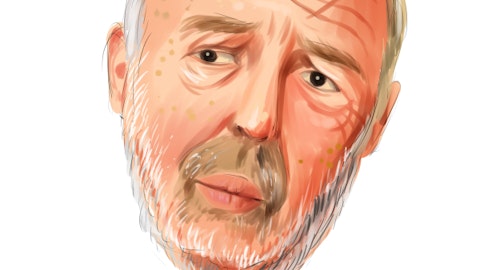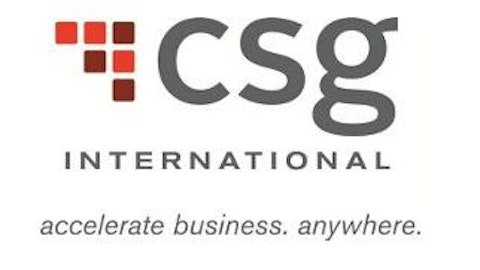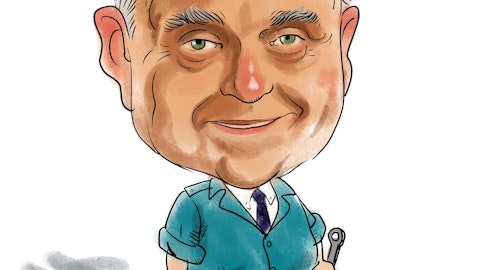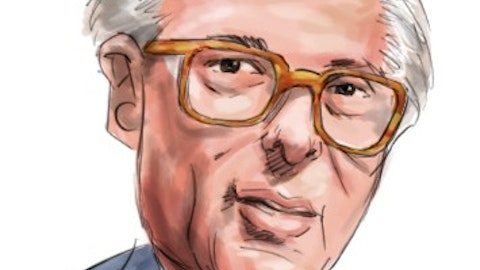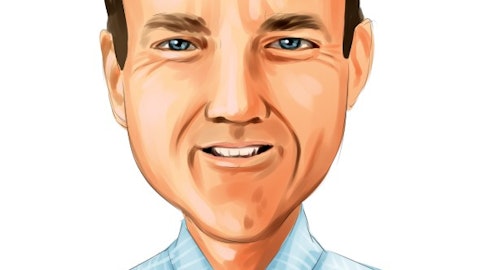Ric Dillon is head honcho at the $8+ billion Diamond Hill Capital Management. The firm is publicly traded on the NASDAQ under the ticker DHIL and is part of the Russell 2000 Index. Diamond Hill takes long-term approach to capital management and believes heavily in the concept of reversion to intrinsic value. In this article we will take a closer look at Diamond Hill Capital’s top stock picks:
| CompanyName | Ticker | Value | Activity |
| OCCIDENTAL PETROLEUM CORP | OXY | 279521 | -2% |
| ANADARKO PETROLEUM CORP | APC | 258996 | -1% |
| UNITED TECHNOLOGIES CORP | UTX | 246877 | -2% |
| ABBOTT LABORATORIES | ABT | 226778 | -2% |
| PFIZER INC | PFE | 213616 | -1% |
| MEDTRONIC INC | MDT | 210037 | -2% |
| PROCTER & GAMBLE CO | PG | 205784 | 1% |
| MICROSOFT CORP | MSFT | 192065 | -7% |
| PEPSICO INC | PEP | 191440 | -4% |
| P N C FINANCIAL SERVICES GRP | PNC | 181597 | -3% |
Occidental Petroleum (NYSE: OXY) has been lagging in recent history. We too have not been thrilled by capital spending overruns and awful reserve replacements in the past year and a half. To stem the bloodshed, the company has made a couple moves. It hired a new EVP of Operations, Willie Chiang. He was rumored to be in the running for the top job at Phillips 66 but that went to Greg Garland. Chiang’s expertise has been in refining, so we’re not sure how that will translate into better performance at OXY but we’ll just have to see. With shares below $80, we thought the company would be buying back shares like mad. However, this has not materialized. In Q1 calls, CEO Chazen did indicate that buybacks would take place, and we think they will. If share repurchases get OXY to a 7% cash yield this year, there is no way the stock should trade below $80, especially with improvements in California. We’re in as are Ralph Whitworth, Leighton Welch, and Robert Bishop.
Anadarko Petroleum (NYSE: APC) has been operating smoothly thus far with decent FCF generation. The stock is trading relatively in line with its large cap peers. And though we think there are additional unlocked sources of value in West Africa (offshore), the Gulf of Mexico, and other resource play programs, until the Tronox trial is over, we would not recommend establishing a position. In this $25 billion environmental lawsuit, Tronox and the US government are up against APC and Kerr-McGee that will assign blame for Tronox’s “toxic past.” Chemical maker, Tronox, had filed for Chapter 11 in 2009. In terms of what investors expect, according to a Credit Suisse survey, 65% of respondents believe the valuation embeds more than $1.5 billion for Tronox, including 31% between $1.5 and $2.5 billion and 34% above $2.5 billion. APC management does not seem to want to settle, so we expect this to get dirty.
United Technologies (NYSE: UTX) is an industrial conglomerate with brands like Otis (world’s largest elevator company), Carrier (commercial/residential heating and air-conditioning systems and commercial transport refrigeration equipment), Pratt & Whitney (supplies military and civil aircraft engines and service operations), and Sikorsky (helicopters). UTX is a major player in aerospace and defense as well as global infrastructure, and we think the company can continue to post solid results accompanied by share repurchases given its substantial FCF conversion. However, we don’t see many upcoming catalysts and would prefer a global operator with more ex-US sales (UTX derives 60 percent of sales from the US).
Abbott Laboratories (NASDAQ: ABT), like other big pharma companies, faces a looming patent cliff. It currents dominates the autoimmune market, an estimated $25 billion market that includes treatment for rheumatoid arthritis, Crohn’s disease, Addison’s disease, multiple sclerosis, and type I diabetes. ABT’s Humira is the world’s best-selling drug in the autoimmune market, with an estimated market share of well over 30% (mostly to treat rheumatoid arthritis). 2011 Humira revenues were over $8 billion, and we think this could accelerate to $10.5 billion by 2013. However, ABT’s HIV antiviral, Kaletra, has been losing market share in part because of exclusion from the list of preferred treatment options in some US Department of Health and Human Services’ (DHHS) guidelines. Overall ABT has a decent pipeline but we prefer pharma companies with catalysts and a strong pipeline like Pfizer (read more on Why Hedge Funds Love Pfizer).

